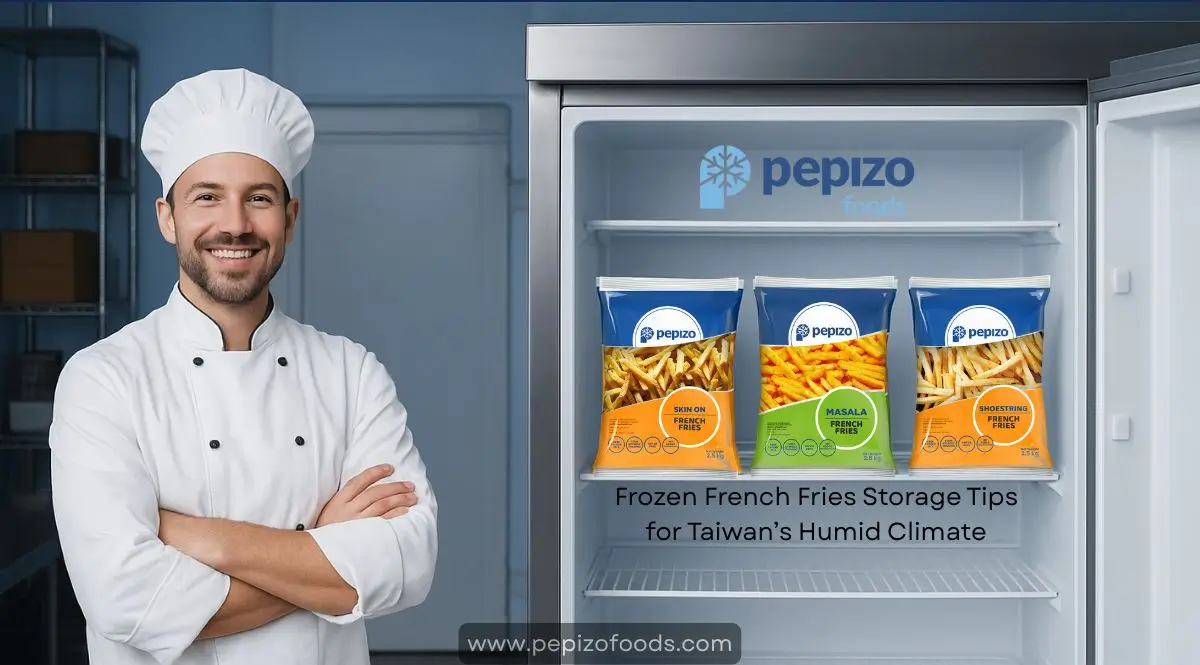Do frozen fries become soggy over time? Do customers complain about clumpy fries? This happens very commonly in humid climates, and in Taiwan, humidity is a daily life problem. Thus, a nightmare for restaurant owners.
This blog is about managing the storage of frozen French fries during Taiwan's intense and unpredictable weather. We're discussing real-life problems to safeguard the frozen french fries you're storing in your restaurant; this one is for you. So let's talk potatoes.
Why Frozen French Fries Misbehave in Humid Taiwan?
Humidity is the villain that quietly enters your freezer and messes with your frozen goods. And let’s be honest, Taiwan’s weather doesn’t give your freezers much of a break. Ever wondered why the taste changes even when you follow the instructions perfectly? Or why some fries freeze into one sad block? Most of the time, it’s not the fries. It’s the moisture.
Humidity does three things:
- Creates ice crystals
- Causes freezer burn
- Makes the texture uneven
All of these affect the final crispness you want from your frozen french fries. And if you’re a restaurant owner, one bad batch can easily turn into 10 unhappy customers. So let’s take control.
So, How to Fix This? Start with the Basics
Before we get into advanced techniques, let’s get one thing clear: storage decides everything. The quality, the crispness, and the final taste depend entirely on how to store frozen french fries. And because Taiwan’s humidity plays games with your freezer temperature, you need to outsmart the weather with consistency.
Ask yourself:
Are you opening the freezer door too often?
Are your fries kept near the freezer light?
Are they exposed to warm air during delivery?
Sometimes small habits change big results. Now let’s break this down properly.
Best Storage Tips for Frozen French Fries (Especially for Humidity)
These storage tips for frozen french fries are simple, but they genuinely work. And they’re perfect for both restaurant kitchens and home freezers.
1. Store Them Deep Inside, Never Near the Door
Every time the freezer door opens, warm and humid air enters. If your frozen french fries sit near that area, moisture will attack them first.
Keep them in the coldest zone.
2. Don’t Overcrowd the Freezer
Too many items reduce circulation. Poor air flow equals poor freezing.
Give your fries breathing room.
3. Reseal Every Time
If you're thinking about leaving the pack open, thinking the freezer will save it, it won’t. Air is the enemy.
You can use:
- Thick zip-lock bags
- Clips
- Vacuum sealers (best for frozen french fries storage for restaurants)
4. Maintain a Constant Temperature
Your freezer should ideally stay below -18°C. And yes, even a 2–3 degree fluctuation makes a difference to frozen goods.
Stable temperatures = stable fries.
5. Don’t Refreeze
Ever thawed a pack slightly and thought you could just throw it back? Don’t. This creates clumping and ice buildup.
Cook immediately or store properly before they defrost.
6. Check the Moisture in the Freezer
Too much frost? That means humidity is entering. A simple defrosting routine once in a while helps big time.
How can Restaurants in Taiwan store frozen French Fries Better?
Running a commercial kitchen is a different game. You’re stocking in bulk, maintaining speed, and serving consistent taste.
Here are some targeted storage tips for frozen french fries for restaurants:
- Keep cartons in a dedicated freezer section
- Use a backup freezer during rush hours
- Keep bags sealed every time a portion is removed
- Avoid stacking boxes too close to the freezer vents
- Train staff on fast, clean freeze-handling habits
These aren’t complex changes. But they will drastically improve your frozen french fries storage for restaurants.
Are Frozen French Fries Gluten Free?
A lot of buyers ask this, so let’s address it. Most frozen french fries are naturally gluten-free because potatoes are gluten-free. But some brands add coatings or seasoning that may include gluten. So, while frozen french fries gluten free options do exist, always check the packaging. If you run a restaurant, this matters even more because customers trust you to serve what you promise.
Ever had someone ask you mid-service, “Are these fries gluten-free?” If you’ve experienced this, you know the panic of turning the pack to check. Better to know beforehand.
Also: The Ultimate Guide to Healthy Frozen French Fries
Real-life Kitchen Mistakes Everyone Makes with Frozen Fries
Let’s talk about the little things. These mistakes sound innocent, but they ruin fries.
- Leaving fries out on the counter during prep
- Putting warm trays back into the freezer
- Buying in bulk but not planning freezer space
- Keeping fries in their delivery boxes for days
- Stocking them near strong-smelling food
Have you done any of these? Be honest. Everyone has at some point.
Once you’re aware of what not to do, you can focus better on how to store frozen french fries effectively.
Why Taiwan’s Weather Needs Extra Care for Frozen Fries?
Humidity above 70 percent can create issues inside commercial freezers, too. So even if your freezer is powerful, moisture tries to sneak in through:
- Freezer door openings
- Staff handling
- Condensation forming on packs
- Delivery timings during hot afternoons
The problem isn’t the frozen french fries. The problem is the climate versus your storage habits. But now you know how to fight back.
Smart Habits to Keep Every Batch Perfect
Here are some easy, real-world habits kitchens should develop. They take seconds but fix major issues.
- Wipe freezer shelves often
- Rotate stock (first in, first out)
- Use thick polybags for open packets
- Keep fries away from freezer walls
- Divide bulk packs into smaller sealed bags
- Never allow ice to coat the fries
- Keep fries flat, not upright
Small habits create big improvements.
What Happens When Frozen French Fries Are Stored Right?
Let’s imagine a perfect scenario.
You open a bag. The fries are separated, no ice, no moisture, no soggy feel. You deep fry or air fry. They come out crisp, golden, and hold their shape. The seasoning sticks better. The crunch doesn’t disappear in two minutes.
That’s the magic of correct storage. And that’s the goal behind all these storage tips for frozen french fries.
But most importantly, perfect storage helps maintain taste even if you buy in bulk.
Which brings us to something important.
Before We Wrap Up: A Quick Note on Bulk Buying
If you're a restaurant, café, cloud kitchen, or reseller in Taiwan, bulk buying quality frozen french fries can save money, time, and reduce supply risks. And when you’re sourcing from India, you expect consistency, taste, long shelf life, and reliable frozen french fries storage for restaurants.
That’s exactly what Pepizo Foods delivers.
- Bulk orders with private labeling
- Consistent cut sizes in every batch
- Premium potato selection cultivated in its own farm
- Strong supply chain for timely delivery
- Quality fries that hold their texture even in Taiwan’s humidity.
If high-volume frying is your daily routine, Pepizo Foods makes sure every batch performs.
The Bottom Line
So, if you want frozen french fries that feel crispy and taste exceptional even in the humid environment of Taiwan, partner with Pepizo Foods today. Connect with us to know more about bulk orders.



